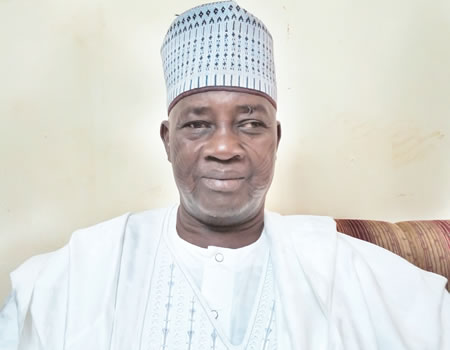It is being said that rice cultivation in Kebbi State has given the state wider publicity and recognition. What is your comment on this?
Thank you very much for this question. I would like to say it clearly that the whole success story of this project is hanging squarely on the governor of Kebbi State. This is because the governor has the political will to do this project to move the state forward in agriculture and he has provided it with an enabling environment for it to succeed. Government projects would succeed if the governor has the political will to do it. Our governor has the passion. This is why we are succeeding.
We are now in the middle of dry season farming, very soon it shall be harvest time gradually we are approaching the wet season. What are the challenges you are facing?
In any society, programme or project of this nature, there is bound to be hitches and if you say there is none, then you are not telling the truth. Among the challenges we are facing is the mapping theory introduced by the Central Bank of Nigeria (CBN). In the last Anchor Borrower exercise, there was no mapping; farmers got their loan and headed straight to their farms. But this time around, CBN has directed that there must be mapping. Farmers must have their Bank Verification Numbers (BVN) and their farms must be mapped with their BVN and the numbers taken to Abuja and CBN will have to assess them, through the Federal Ministry of Agriculture. The mapping alone is a very tedious issue as it takes a longer time. CBN says before a farmer could assess the loan, his farm must be mapped along with his BVN. This directive has not been easy as it takes a longer time to be completed. Really, farming should be a continuous exercise and that was the first hitches we had.
But in terms of implementation, we have been able to implement disbursement of farm inputs to 18,000 for this dry season farming alone. What we are now waiting for is to start implementing the disbursement of cash. In a normal situation, there are two, three types of package: One, there is what we call economic cost of production. This is in terms of package and this money is not from the state government. It is through CBN but it would not disburse the money to farmer directly, but look for a bank through which to channel it. This is why we are dealing with the Bank of Agriculture. Presently, we have finished with disbursement of inputs. It now remains cash backing to enable the farmers to start the economic aspect which has to do with harvesting, bagging etc.
With the low level of literacy among the farmers, how are they able to cope with putting pen on paper?
Generally in each location of the state, the ADPs are the eyes of the government, responsible for the training and assessment of farmers and in any local cycle, we have extension workers who are training the farmers in modern technology. They take the farmers on land preparation, through planting as well as harvesting and up to storage. They also help farmers to get their BVN. In a cluster group, there is a chairman, secretary, treasurer, etc. They also teach farmers how to go to any bank nearest to them to obtain their BVN. In that process, they don’t need to give money to anybody; they just submit their account numbers and the BVN is given to them. Only the chairman represents members of a cluster group at any meeting and takes messages from the anchor borrower to their various members.
At the inception of the programme, about 75,000 farmers were registered but as time went by, there was reduction in this number. What is responsible for this?
During the previous programme, these measures, such as BVN and mapping that are in place now were not there. In the previous programme, we had 70,000 farmers but they were not bugged by the CBN directives. But this time around, any farmer coming to the programme must have a farm of not less than one hectare and it must be mapped and your photo must be taken. But I can assure you that by the coming wet season, the numbers will be more than what we are having now. Farmers are more involved in wet season because of the less rigour they encounter unlike the dry season. The sister arm of the Bank of Agriculture, which is NAISRIL, has already engaged another set of 20,000 farmers for this purpose. Therefore we are getting up to 30,000 farmers. Agriculture is time-bound and time-consuming and more people are coming in.
ALSO READ: Nigeria agricultural export now N5bn —Ogbeh
How are the beneficiary farmers paying back their loans?
This is another interesting question. For any farmer to collect the loan, we have to involve the traditional ruler of his domain who would attest to his character and give an assurance that such a farmer would not default. Everything in life is a training process where you learn. That is, if you make a mistake, you must have learnt from it and you are not expected to make such a mistake again. This is why we involved the traditional rulers who would vouch for such a farmer before collecting the loan. Secondly, the loan repayment system has now changed. In the previous arrangement, if a farmer is given N10,000, he is expected to pay N10,000 at once. But now, you pay by instalment.
Are the farmers happy with this arrangement?
Well, I am happy to say that in any human situation, there are bad people and there are good ones. We are now succeeding with over 70 per cent success. We have not attained 100 per cent yet. The farmers know their roles; the extension workers also know their roles. The situation is improving as the farmers know the money is not from the government. The money is through the bank and it is not the usual jamboree. The most interesting part of it is that most of the repayment is via market forces. If the market price is N10,000 and the farmer sells for N1,000, he can come back and access another loan.
I am happy to tell you that now a lot of people are coming here and up takers rice mills are springing up here and there and farmers are happy. I can assure you that any miller who can come to Kebbi to invest with even N1billion, he can get rice within six months. We have started harvesting and once we harvest, the market is there. What we are now requesting from the government, both at the state and federal levels, is to subsidise the cost of inputs such as petrol, water pump etc. If government can subsidise the cost if inputs, I can guarantee you that the price of rice can come down to N7,000 per 75kg bag.





